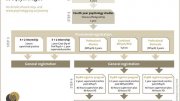
An educational psychologist might focus on doing research or creating and implementing programs that can help people learn more effectively. Many work as school psychologists, working with educators to devise ways to help students and their families. School psychologists need a graduate degree, which they can earn through specialist, master's or doctoral programs. Most states require that anyone who uses the title of psychologist hold a license or certification, which generally calls for meeting education and experience requirements and passing an examination.
| Required Education | Graduate degree in a relevant field |
| Other Requirements | State licensing or certification |
| Projected Job Growth (2012-2022)* | 11% (clinical, counseling or school psychologists) |
| Average Wage (2013)* | $72, 710 (clinical, counseling or school psychologists) |
Sources: *U.S. Bureau of Labor Statistics
Job Description for an Educational Psychologist
Educational psychologists might work for schools or government agencies, as well as in the private sector. They might be involved with the development of instructional methods and materials, in addition to studying existing educational programs to see what's working and what needs improvement. Some educational psychologists work directly with educators to train them in effective teaching methods, while others develop curricula and tests.
Specific duties may depend in part on area of specialization, such as human development, learning sciences or school psychology. For example, a school psychologist might provide counseling services to students and work with teachers and parents to resolve issues a student is experiencing. School psychologists also might work with students who have learning disabilities or those who have behavioral or social problems, ADHD or autism.
Source: study.com
You might also like:




















